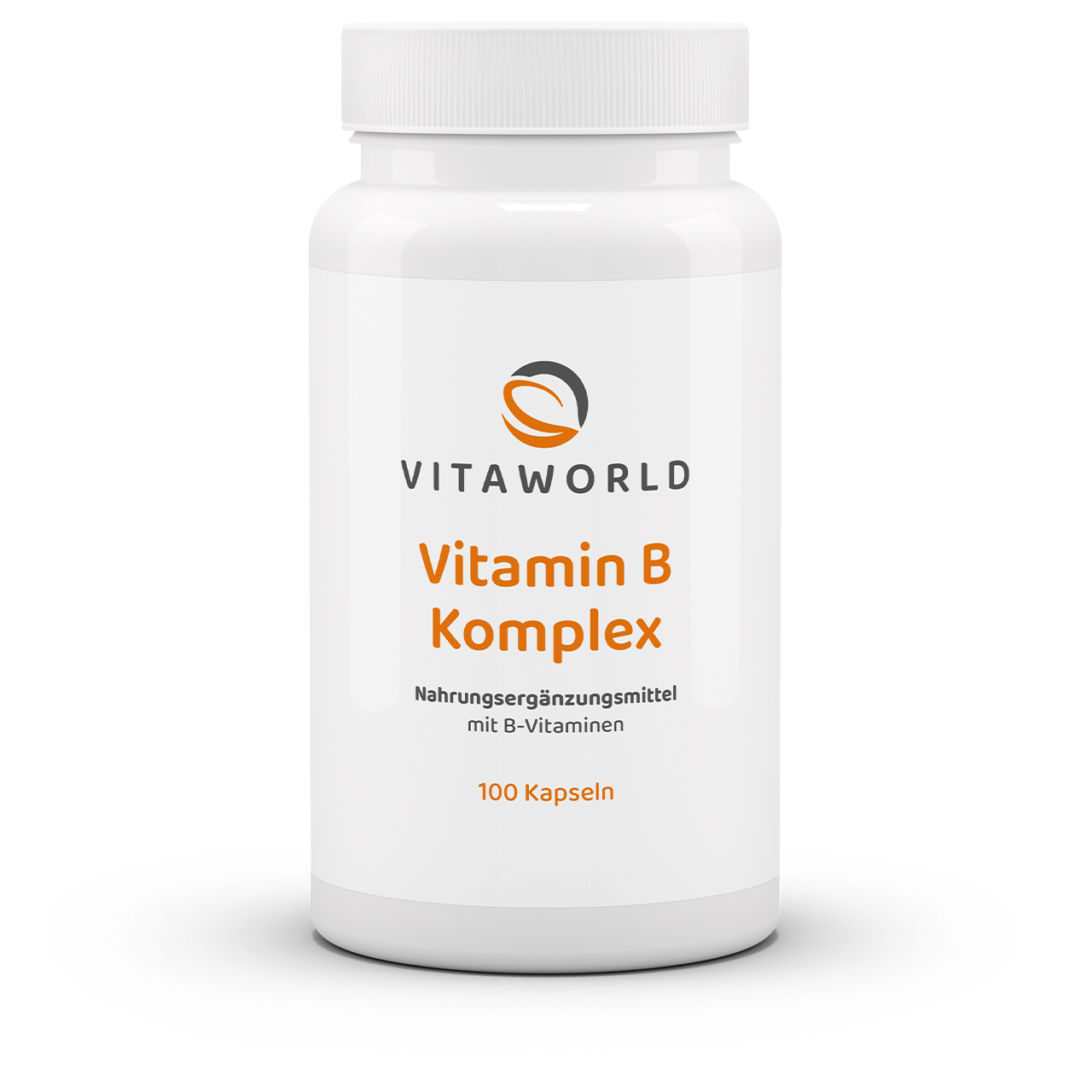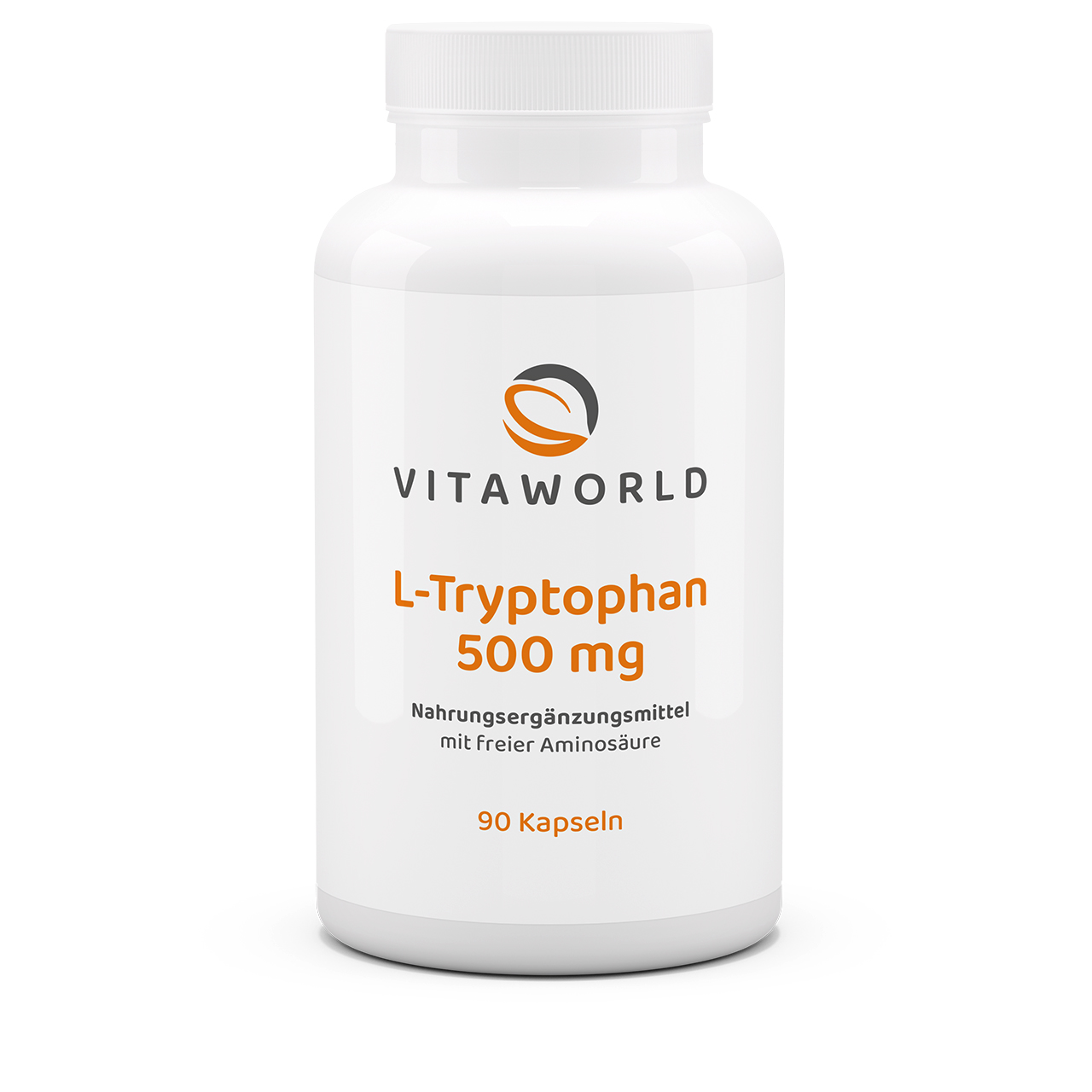Spring fever for the soul with 5-HTP, L-tryptophan and vitamin B6 for more balance
Wonderful! The birds are chirping earlier again, everything is already in bloom and the first coffee in the sun becomes a little everyday happiness. Sounds like lightness, doesn't it? But sometimes our inner balance can't quite keep up. This is exactly where three natural mood boosters come in: L-tryptophan, 5-HTP and vitamin B6. They support the production of the important feel-good hormone serotonin and gently bring your sleep-wake rhythm back into balance [1].
You can find out how this works, who it is suitable for and what you should look out for when using it in our article. Let's go!
Serotonin: activate the feel-good hormone in spring
We are the makers of our own happiness, even in a physical sense: the human body produces the happiness hormone serotonin itself. But only if it contains the right building blocks. This is where our substances L-tryptophan and 5-HTP come into play. The production pathway of the happiness hormone leads from the essential amino acid L-tryptophan via L-5-hydroxytryptophan (5-HTP) to serotonin. Voilà! Incidentally, this important hormone not only influences mood, but also appetite, sleep and emotional stability [1].
Now in spring, when the day-night rhythm is trying to readjust, it is worth gently supporting serotonin production. This can lead to more clarity, focus and a good gut feeling. Are you worried that you don't have enough serotonin in your body? A low serotonin level can make itself felt through irritability, tiredness, mood swings or problems falling asleep [2].
5-HTP: the direct route to the happiness hormone
Don't be put off by complicated names, because it's worth taking a closer look at 5-HTP! 5-Hydroxytryptophan (5-HTP) is a direct precursor of serotonin and is extracted from the African plant Griffonia simplicifolia. It acts as a natural mood booster and, as a precursor to serotonin, can lift your mood without making you feel hyper. After a few days of regular intake, many people feel more serenity, inner stability and a calmer sleep [2].
What is 5-HTP good for [2]?
Here are the benefits of 5-HTP at a glance:
- Supports with stress, inner restlessness & low moods
- Supports with PMS, cycle problems & hormonal fluctuations
- Supports a balanced day-night rhythm
As a dietary supplement, 5-HTP is usually available in vegan capsules, often combined with vitamin B6 to facilitate its conversion into serotonin.
Sleep well! Fall asleep gently with 5-HTP
Do you have trouble sleeping? Here too, 5-HTP could be your drug of choice. Because serotonin is later converted into melatonin and thus regulates the melatonin concentration, 5-HTP also indirectly supports sleep. The amino acid has proven particularly effective for problems falling asleep or a disturbed sleep-wake rhythm [2]. Pretty handy, isn't it?
L-tryptophan: the basis for more balance
L-tryptophan is an essential amino acid that must be obtained from food. However, the amount from cheese, nuts or oats is often not enough to specifically influence serotonin levels. A capsule of L-tryptophan can be useful here - especially in high doses if there is an increased need [1].
What does L-tryptophan do in the body?
Let's get scientific: Enzymes such as tryptophan hydroxylase, hydroxytryptophan decarboxylase, tryptophan 2,3-dioxygenase and indoleamine 2,3-dioxygenase first turn tryptophan into 5-HTP, then serotonin - and finally into the natural sleep regulator melatonin [2]. Or to put it more simply: in the body, tryptophan is turned step by step first into 5-HTP, then serotonin and finally melatonin. With the help of special proteins that make this conversion possible.
Tryptophan as a dietary supplement - when and how?
Have you decided to give tryptophan a try? Then this information is important for you: Ideally, you should take tryptophan in the evening, as it can have a calming and sleep-promoting effect [1]. Incidentally, its absorption is improved by carbohydrates, as these can facilitate its passage through the blood-brain barrier. Bonus tip: In combination with vitamin B6, the conversion is particularly effective [4]!
Important: If you are taking MAO inhibitors, SSRIs or other medications, please speak to a healthcare professional before taking them for the first time to rule out any unwanted interactions.
Does tryptophan make you tired?
Yes, tryptophan can make you tired [1]. And this may even be desirable! Benefit from this effect by taking tryptophan in the evening or during rest periods to promote your inner calm.
Vitamin B6: the co-factor for nerves, mood & energy
Vitamin B6 (pyridoxine) plays an important role in our mood, because without this vitamin the body can neither convert tryptophan into 5-HTP nor 5-HTP into serotonin. It increases the activity of the enzymes that form serotonin and contributes to mental function, energy metabolism and the normal functioning of the nervous system [4].
Typical signs of vitamin B6 deficiency
Do you feel exhausted in everyday life and often find it difficult to concentrate at work? This could indicate a vitamin deficiency. The most common symptoms of a vitamin B6 deficiency are [6]:
- Irritability
- Tiredness
- Concentration problems
- Nervousness
- Tingling in arms and legs
Where is there a lot of vitamin B6?
As is so often the case, nutrition is the key to health and well-being. So it's best to eat a balanced diet if you want to eat a vitamin-rich diet. These foods are particularly rich in vitamin B6:
- Lentils
- Chickpeas
- Avocados
- Walnuts
- Bananas
- Fish
- Meat
- Wholemeal products
Those who follow a vegetarian or vegan diet often also benefit from targeted vitamin B6 suppliers in the form of food supplements. Ideally, you should combine a vitamin B complex with tryptophan or 5-HTP.
Why the combination is so effective
The combination of L-tryptophan, 5-HTP and vitamin B6 is no coincidence. It works synergistically and naturally increases serotonin levels. This is also supported by amino acids such as L-phenylalanine and L-DOPA, which are supplemented in some combinations.
And because these substances belong to the group of non-proteinogenic amino acids, they fit perfectly into a healthy lifestyle. This means that they are building blocks that are not used directly for muscle building, but perform special tasks in the nervous system. This is particularly valuable in spring, when we are not only reorganizing our homes, but also our bodies and minds.
Safety & instructions for use
As is so often the case, the same applies here: Please do not exceed the recommended daily amount in mg. The body can only absorb as much as it really needs. High doses therefore do not automatically have a greater effect. And very important: food supplements are no substitute for a varied diet. They can be a wonderful supplement, but fresh fruit, vegetables and the like remain the basis for your health.
Are you pregnant, breastfeeding or have pre-existing conditions? Then please seek medical advice first! The same applies to young children: it is better to talk to a doctor first. If you are taking medication, especially antidepressants, MAO inhibitors or serotonin reuptake inhibitors, you should always consult a specialist before taking them.
Conclusion: The soul can now breathe a sigh of relief
More sun, more light, more life - and with the right support, more balance from within. With L-tryptophan, 5-HTP and vitamin B6, you can give your body exactly what it needs right now: Balance, energy and emotional stability. For an all-round good mood, deeper sleep and more inner peace, without any detours, but with a lot of feeling. Try it out and support your sense of well-being!
FAQ - Frequently asked questions
What is L-tryptophan good for?
L-tryptophan is an essential amino acid that the human body cannot produce itself. It is the starting substance for the formation of serotonin and melatonin and can therefore have a positive effect on mood, sleep and inner peace. It can be a natural supporter, particularly in the case of problems falling asleep and stress. [1]
Is tryptophan a natural antidepressant?
Tryptophan is not an antidepressant in the medical sense. However, due to its effect on serotonin levels, L-tryptophan can have a mood-stabilizing effect and promote emotional balance [3]. Especially in combination with vitamin B6, the conversion to serotonin is increased.
What happens when I take L-tryptophan?
After ingestion, L-tryptophan is converted into 5-HTP and later into serotonin with the help of enzymes such as tryptophan hydroxylase, hydroxytryptophan decarboxylase, tryptophan 2,3-dioxygenase or indoleamine 2,3-dioxygenase. This can improve your mood and stabilize your sleep-wake rhythm.
Is tryptophan a happiness hormone?
Tryptophan is not directly a happiness hormone. However, it is the precursor of serotonin, the so-called happiness hormone, which influences the day-night rhythm and emotional balance, among other things.
What is 5-HTP good for?
5-HTP is ideal for low moods, inner restlessness or hormonal fluctuations [5]. It has a direct effect on serotonin production and is often used for sleep problems or irritability.
When should you not take 5-HTP?
Please do not combine 5-HTP with serotonin reuptake inhibitors, MAO inhibitors and do not take it for certain mental illnesses. Prior medical advice is also important for young children, pregnant women and breastfeeding mothers.
Is 5-HTP safe?
5-HTP is well tolerated in the recommended doses. Look out for certified quality.
What does vitamin B6 do?
Vitamin B6 supports mental function, the formation of serotonin and energy metabolism [4]. Without it, L-tryptophan cannot be optimally utilized.
How does a vitamin B6 deficiency manifest itself?
Symptoms can include irritability, poor concentration, tiredness, nervousness or tingling in the arms and legs [6]. Low vitamin B1 levels can also have similar effects.
Sources:
[1] https://pmc.ncbi.nlm.nih.gov/articles/PMC2908021/
[2] https://www.healthline.com/nutrition/5-htp-benefits
[3] https://aminoacidsguide.com/Trp.html
[4] https://health.clevelandclinic.org/vitamin-b6
[5] https://www.webmd.com/vitamins/ingredientmono
[6] https://www.msdmanuals.com/vitamin-b6-mangel


